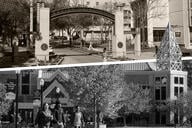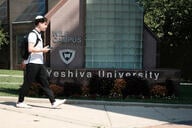You have /5 articles left.
Sign up for a free account or log in.
There’s a plan, essentially, to install a basin. And a spigot.
And so the floodgates open.
Minneapolis Community and Technical College’s plan to install a washing basin where Muslim students can ritually wash their feet pre-prayer -- and potentially to use tax dollars to fund said sink -- came under fire Thursday after a Star Tribune columnist skewered the college for allegedly perpetuating a double standard in restricting Christian expression while facilitating Muslim prayer. The columnist Katherine Kersten describes a situation last year where “complaints and concerns” were raised when “[a] coffee cart that sells drinks and snacks played holiday music ‘tied to Christmas.’ ”
"College authorities quickly quashed the practice,” Kersten writes. “They appear to take a very different attitude toward Islam.”
The public scrutiny of course reflects a clash of cultures, particularly in a city with a growing Muslim population, where popular debate in recent months has focused on questions of whether Muslim taxicab drivers should have to transport passengers with alcohol and whether Muslim cashiers should have to scan bacon.
But beyond that, the plan to install a foot-washing basin also raises questions of church-state separation, and a college's need to remain neutral while accommodating a growing segment of the student body -- and in this case, at least, promoting safety.
“Over the last several years, as we’ve had increased immigration from folks from Africa and elsewhere who are also Muslim, we've found that their pre-prayer rituals, which include feet washing, often, have been an issue of concern with respect to safety,” says Phil Davis, president of Minneapolis Community and Technical College. Without a low-level washing facility available, students have typically resorted to placing their feet in the sinks of public restrooms, he says -- creating a hazard both for themselves and students who then have to cross a wet floor. About 500 of the university’s 11,000 students are Muslim.
“Recently, a student who was washing her feet in the sink fell and was seriously injured. That brought renewed attention to this issue. We said, 'Well, we think the most reasonable response, or at least a reasonable response, is to explore what kind of foot-washing resource we could provide to ensure the safety of our Muslim students and also those that come in behind them,' " Davis says.
At least 12 other public institutions offer foot-washing facilities to Muslim students, Davis says: A list provided by the college identifies California State University at Fullerton, the University of Houston, George Mason University, Harper Community College in Illinois and Eastern Michigan University, among others. “Our view is that we as a state agency cannot promote religion; we’re very clear about that," says Davis. "At the same time, students at colleges and universities in America have the right to freely express their religious beliefs.... We think we have the very same standard for all students. That is, for example, when student clubs and organizations that are officially chartered ask for college space, we make that space available to the extent it is available."
Yet, Barry Lynn, executive director of Americans United for Separation of Church and State, says that the Minneapolis college is in the wrong in this case. “I don’t think the constitution permits you buying an item or building a facility used exclusively by one religious group,” Lynn says. While President Davis says it’s unclear whether or not the college will end up using tax dollars to install the facility, Lynn says the college could risk breaching the separation between church and state regardless. "You'd have to show a willingness to open up whatever the space is, or a comparable space, for other items for religious use," he says, referring to an ever-expanding standard of accommodation the college would have to meet if officials install a foot-washing basin for Muslim students. "Then you’d probably have to open it up to items for secular use."
“If somebody wanted to put up a waterfall for peace or something, just some water flowing over a rock ... once you open what’s called a limited public forum, a part of a government facility for the placement of one item, you’re really literally opening the floodgates for everybody else to insist that their item be placed there as well,” Lynn says.
Ibrahim Hooper, spokesman for the Council on American-Islamic Relations, disputes concerns that installing washing facilities at public universities would violate the separation of church and state. “It’s not a promotion of a particular faith. People aren’t saying, ‘Oh, become a Muslim so you can use this faucet.’ It’s an accommodation of existing students," he says.
“By offering this reasonable accommodation, I think the college is sending a positive message to the Muslim students and just making it easier for all parties concerned,” Hooper says. “We see a disturbing trend now when any accommodation of Muslims in American society brings the wrath of anti-Muslim extremists who seek to marginalize the Muslims in America.”
Davis says that the college is still in the early stages of pursuing the plan. Its officials still don't have a cost estimate, but expect any facility to be "cost effective," he says. Officials are looking to other institutions with these facilities in place for guidance.
Meanwhile, Davis says, the board of trustees for the Minnesota State Colleges and Universities system has requested an update on the project at its meeting next week.




